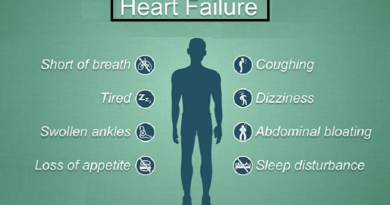Rheumatic Diseases: Symptoms, Diagnosis and Treatment
When it comes to our health, there are numerous conditions that can affect us, some of which remain shrouded in mystery, such as rheumatic diseases. These are a group of health conditions that can cause pain, inflammation, and limitations in daily activities. In this article, we will discuss rheumatic diseases, their nature, their impact on individuals, and the available treatment options.
Understanding Rheumatic Diseases
These diseases include a wide range of disorders that primarily affect the joints, muscles, bones, and connective tissues throughout the body. These conditions are often characterized by inflammation, pain, and stiffness, making them a significant cause of disability and reduced quality of life for millions of individuals worldwide.
One of the most well-known rheumatic diseases is rheumatoid arthritis (RA), an autoimmune disorder that primarily affects the joints. RA causes chronic inflammation, leading to joint damage and deformities if left untreated. Other common rheumatic diseases include systemic lupus erythematosus (SLE), ankylosing spondylitis, gout, and fibromyalgia.
While the exact causes of most rheumatic diseases remain unknown, certain risk factors have been identified. These may include genetic predisposition, environmental triggers, hormonal influences, and lifestyle factors. These diseases can affect people of all ages and genders, but some are more prevalent in specific populations, such as rheumatoid arthritis, which is more common in women.
Symptoms
The impact of rheumatic diseases on individuals can be profound, affecting their ability to perform everyday tasks, work, and engage in social activities. The symptoms can vary widely depending on the specific condition, but common manifestations include joint pain, swelling, stiffness, fatigue, muscle weakness, and limited mobility.
Furthermore, the effects of rheumatic diseases extend beyond physical discomfort. Many individuals experience emotional and psychological challenges, such as anxiety and depression, as a result of living with chronic pain and the limitations imposed by these conditions.
Diagnosis
Diagnosis can be complex, as many symptoms overlap with other conditions. It includes the following steps:
- Medical History:
The healthcare provider will take a detailed medical history, including information about the patient’s symptoms, their onset, duration, and any factors that worsen or alleviate the symptoms. They will also inquire about the patient’s family history of rheumatic diseases or other relevant medical conditions. - Physical Examination:
A thorough physical examination will be performed to assess the patient’s joints, muscles, and overall physical condition. The healthcare provider will look for signs of inflammation, joint swelling, stiffness, and deformities. - Laboratory Tests:
Various laboratory tests may be ordered to aid in the diagnosis of rheumatic diseases. These tests can include:- Blood tests: These may include complete blood count (CBC), erythrocyte sedimentation rate (ESR), C-reactive protein (CRP), rheumatoid factor (RF), antinuclear antibodies (ANA), and specific autoantibodies associated with different rheumatic diseases.
- Imaging tests: X-rays, ultrasound, magnetic resonance imaging (MRI), or computed tomography (CT) scans may be performed to visualize the affected joints, bones, and soft tissues. These tests help in assessing the extent of joint damage, inflammation, or other structural abnormalities.
- Joint Aspiration:
In certain cases, the healthcare provider may perform joint aspiration or arthrocentesis. This involves removing a small sample of fluid from an inflamed joint to analyze it for signs of infection, crystals, or other abnormalities. - Specialized Consultations: Depending on the suspected diagnosis, the healthcare provider may refer the patient to a rheumatologist who are physicians specialized in diagnosing and treating rheumatic diseases.
Treatment
The treatment focuses on managing symptoms and slowing disease progression. Treatment may vary depending on the specific condition and its severity. Here are some common treatment options:
- Medications:
Nonsteroidal anti-inflammatory drugs (NSAIDs) are often prescribed to relieve pain and reduce inflammation associated with rheumatic diseases. Corticosteroids may be used for short-term symptom relief during flare-ups. Disease-modifying antirheumatic drugs (DMARDs), such as methotrexate or sulfasalazine, are used to slow down the progression of certain rheumatic diseases. Biologic agents, including TNF inhibitors or interleukin inhibitors, target specific molecules involved in the immune response and are prescribed for moderate to severe cases. - Physical therapy:
Physical therapy is often recommended to improve joint mobility, strengthen muscles, and manage pain. Therapeutic exercises, stretches, and techniques such as heat or cold therapy may be utilized to enhance function and reduce symptoms. - Lifestyle changes:
Maintaining a healthy lifestyle is crucial for managing rheumatic diseases. Regular exercise helps improve joint flexibility and strengthen muscles. A balanced diet can support overall health and may have specific benefits for certain conditions. Adequate rest and sleep are essential for managing pain and fatigue. Stress management techniques, such as relaxation exercises or mindfulness, can also be helpful. - Assistive devices:
Depending on the severity of joint involvement, assistive devices such as braces, splints, or orthotics may be recommended to support and protect joints, improve function, and reduce pain. - Surgery:
In some cases, when conservative treatments fail to provide sufficient relief, surgical interventions may be considered. Joint replacement surgery, synovectomy (removal of inflamed synovial tissue), or tendon repair may be options for certain rheumatic conditions.
SUMMARY
Rheumatic diseases may be shrouded in mystery, but understanding their nature and impact is crucial for both patients and the medical community. By shedding light on these conditions, we can raise awareness, improve diagnosis and treatment, and ultimately offer a brighter future for individuals living with rheumatic diseases.
If you suspect that you may have symptoms, Helalmedical can help, offering quick, private, and convenient testing options. You may contact us here: Facebook page.




